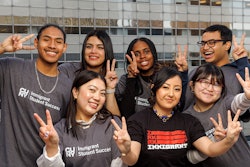Brian Slodysko, Associated Press
INDIANAPOLIS ― Former Indiana Lt. Gov. Sue Ellspermann was selected Wednesday as the next president for the state’s community college system.
Ivy Tech Community College trustees voted 11-0 to hire Ellspermann, who for months has been considered the leading candidate to replace outgoing school President Thomas Snyder. She will begin in the new position on July 1.
Ellspermann, a rapidly rising state GOP star, resigned as lieutenant governor in March amid a reported rift with Republican Gov. Mike Pence. She holds a doctorate in industrial engineering and ran her own consulting firm before she was elected to the Indiana House in 2010, and was tapped just two years later to join Pence’s gubernatorial ticket.
Pence appoints all members of the Ivy Tech board and said in December ― months before Ellspermann stepped down ― that she was an “ideal” candidate for the position.
Ellspermann, who has been adamant in her opposition to negative campaigning, was replaced by current Lt. Gov. Eric Holcomb, a political operative and former U.S. Senate candidate. Holcomb was brought on just as Pence was preparing for what is expected to be a difficult re-election campaign against former Democratic House Speaker John Gregg.
Ellspermann will face a daunting task heading up the community college system. Ivy Tech has drawn scrutiny over the past year for low graduation rates and declining enrollment under Snyder, who has overseen the system’s more than 30 campuses since 2007.
A search committee that launched a $120,000 effort to find Snyder’s replacement was initially expected to announce a new president in July. Snyder’s previous Ivy Tech contract was extended in 2012 until mid-2017.
Questions over Ivy Tech’s low graduation rates and a 25 percent enrollment drop over the past three years prompted state legislators last year to put the college’s construction plans on hold. Lawmakers also directed the Indiana Commission for Higher Education to review and possibly restructure Ivy Tech programs that had low graduation rates.
Snyder has blamed the graduation rate troubles on the school having mostly part-time students, with thousands transferring to four-year colleges without completing Ivy Tech degree programs.
State reports last year show 5.2 percent of full-time Ivy Tech students complete an associate degree within two years, with 27.7 percent finishing within six years. For part-time students, 2.1 percent graduate within two years and 20.8 percent do so in six years.
Before its recent decline, Ivy Tech had seen an enrollment boom of about 70 percent in seven years, reaching a peak of some 110,000 students attending at least part time in the fall of 2011.
Snyder said much of the drop since then has come from older students being unable to afford tuition and instead choosing to take jobs that become available.









